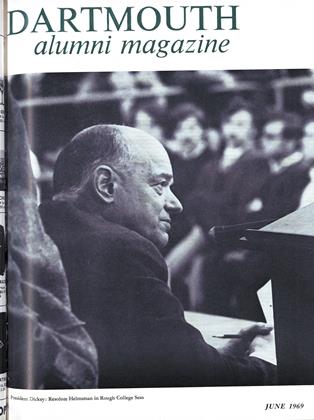By Harold L. Bond '42, Henry W. Ehrmann,Reese T. Prosser, and Robert K. Green-leaf. Hanover, N. H., 1969. 267 pp. $5.50.
The front cover of this handsome paperback shows William Blake's Ancient of Days with a windswept beard and a pair of calipers, striking the first circle of the uncreated earth. The four speakers whose lectures are collected inside make no pretense to the kind of architectural omniscience which Blake attributed to God the Creator. But they are all very good at taking the measure with their own intellectual calipers of the present state of man on that earth that God made, 10 those many years ago.
These are the lectures delivered at the Dartmouth Alumni College in the summer of 1968, the fifth year of this enormously successful enterprise. The working sessions last ten days. There are four courses with modest reading assignments. Each morning and noon there are lectures and discussions. After that, for fun and diversity, there is a varied program of plays, concerts, films, and special lectures in Hopkins Center. The Alumni College begins and ends with a banquet. In between comes the banquet of ideas, a sort of updated Socratic symposium.
Last summer Harold Bond of the English Department offered Four Studies of Man'sFate; Henry Ehrmann of the Government Department gave a series on Private Manand Political Society; Reese Prosser of the Mathematics Department discussed problems relating to Science and Government; and Robert Greenleaf of the American Telephone and Telegraph Company spoke on Leadership and the Individual. Does such a curriculum look to the coursing eye a shade dull and abstract? If so, that eye is deceiving its owner. Nothing could be livelier, nothing could be more relevant to the great question of man and his predicament in the last third of the twentieth century.
It is impossible in a brief review to do more than hint at the brilliance, the levelheadedness, and the lasting value of these lectures. Bond's reading assignments included Sophocles' Antigone and Oedipus the King,Man's Fate by Andre Malraux, and Albert Camus' The Stranger. Ehrmann had his flock read Seymour Lipset's Political Man and a volume of essays called Democracy in aChanging Society. The background for Prosser's course of lectures was Donald Price's The Scientific Estate, while Greenleaf led his group through Kenneth Boulding's memorable book, The Meaning of the TwentiethCentury, a title that only a leading sociologist would dare to use.
One of the liveliest sections appears at the end of the book, when the panel of lecturers fielded questions from a composite character here identified as "Floor." This was of course shorthand for the alumni students, who came up with ideas that covered the spectrum from racism to the race for the moon, and wove in and out like sharp tatting needles through every gap from the generation to the credibility gap. Mr. and Mrs. Floor had plainly profited from the lectures and discussions, and gave as good as they got. It all added up to serious fun, which is as sound a shorthand description as you can find for the adult learning process.
The Alumni College will meet again this summer. Any alumni who can't make it for 1969 could do no better than buy this book, buy or borrow the assigned readings, and take those four courses for 1968. The world is still at sixes and sevens just as it was last summer: that's one thing you can always count on. The issues raised in 1968 are still there. The only thing alumni will miss by taking the courses in absentia is the chance to set foot on Dartmouth greensward once again.
Mr. Baker is Woodrow Wilson Professor ofLiterature at Princeton and author of theErnest Hemingway biography published inApril.
 View Full Issue
View Full Issue
More From This Issue
-
 Feature
FeatureEight Graduates of Dartmouth Who Were First College Presidents
June 1969 By John Hurd '21 -
 Feature
FeatureTwelve Hours and Their Aftermath: The Student Seizure of Parkhurst Hall
June 1969 By C.E.W. -
 Feature
FeatureThe Class Officers Weekend
June 1969 -
 Feature
FeatureFOUR PROFESSORS WHO ARE RETIRING
June 1969 -
 Feature
FeatureBicentennial Year Begins June 14
June 1969 -
 Article
ArticleAlumni Awards
June 1969
CARLOS BAKER '32
Books
-
 Books
BooksTHE NEW LEAVEN
December, 1928 By H.E.Preston -
 Books
BooksQUICK GUIDE TO THE WORLD'S MOST FAMOUS RECIPES.
FEBRUARY 1970 By JOAN HIER -
 Books
BooksALL THE BEST IN THE MEDITERRANEAN
March 1952 By John B. Stearns '16 -
 Books
BooksWHAT THE OLD-TIMER SAID: TO THE FELLER FROM DOWN-COUNTRY AND EVEN TO HIS NEIGHBOR—WHEN HE HAD IT COMING
JULY 1971 By JOHN HURD '21 -
 Books
BooksThe New York Times
January 1938 By John Hurd '2l. -
 Books
BooksHEMORRHAGE OF LATE PREGNANCY.
January 1957 By JOHN J. BOARDMAN, M.D.



